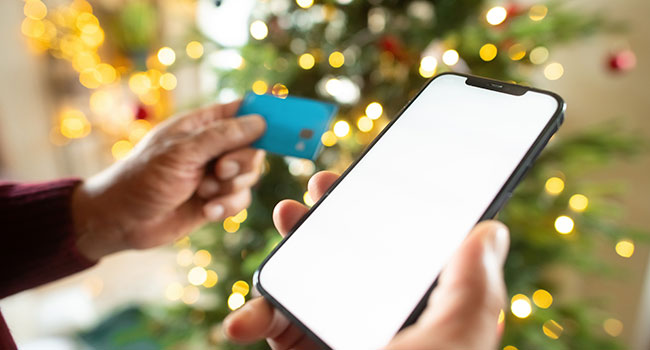Deck the Halls, Not Your Wallet
Stay Fraud-Free This Holiday Season

As the holiday season approaches, excitement fills the air with twinkling lights, festive decorations, and the promise of fun gatherings with family and friends. However, this time of year also brings an increase in fraudulent activities, making it essential for shoppers to stay vigilant. Fraudsters are always looking for opportunities to exploit consumers during busy shopping periods. Here are some key insights into being aware of fraud and tips on how to protect your information and funds this holiday season.
Understanding Holiday Fraud
The holiday season sees a surge in online shopping, which can offer convenience but also creates opportunities for scammers. Common types of fraud during this time include:
- Phishing Scams: These can come in the form of emails, texts, or phone calls pretending to be from legitimate retailers, promising deals that seem too good to be true. Their goal is to trick you into providing personal or financial information.
- Fake Websites: Scammers often create counterfeit websites that mimic popular retailers. Unsuspecting shoppers may fall for these traps, entering their payment information without realizing the site is fraudulent.
- Parcel Delivery Scams: As online shopping increases, so does the number of shipping alerts and tracking notifications. Fraudsters may send fake delivery messages encouraging you to click on links that lead to malicious sites.
- Charity Scams: The holiday season often prompts goodwill, and dishonest individuals take advantage of this by setting up fake charities. They solicit donations, leaving donors feeling scammed and vulnerable.
How to Protect Yourself
To ensure a safe and enjoyable holiday shopping experience, consider the following tips:
- Be cautious with emails and links. Verify the sender's address and avoid clicking on suspicious links. Instead, type the retailer's website directly into your browser.
- Shop securely. Use secure websites when shopping online. Look for URLs that begin with "https://" and display a padlock icon. This indicates a secure connection, protecting your personal information.
- Monitor financial statements. Regularly check your bank and credit card statements for unauthorized transactions. Report any suspicious activity immediately.
- Enable two-factor authentication. If available, activate two-factor authentication on your online accounts. This adds an extra layer of security by requiring a second form of verification beyond your password.
- Avoid public wi-fi for transactions. Refrain from making purchases over unsecured public Wi-Fi networks. Use a virtual private network (VPN) if you need to access the internet in public spaces.
- Research charities. Before donating to a charity, do your homework. Verify that the organization is legitimate by checking reviews and confirming their registration with official sites.
- Be wary of deals that sound too good to be true. If a deal seems unbelievable, it probably is. Be skeptical of steep discounts on well-known products, especially from unfamiliar retailers.
For more security tips or to report fraud, visit the Wescom Security Center at wescom.org/security-center.

